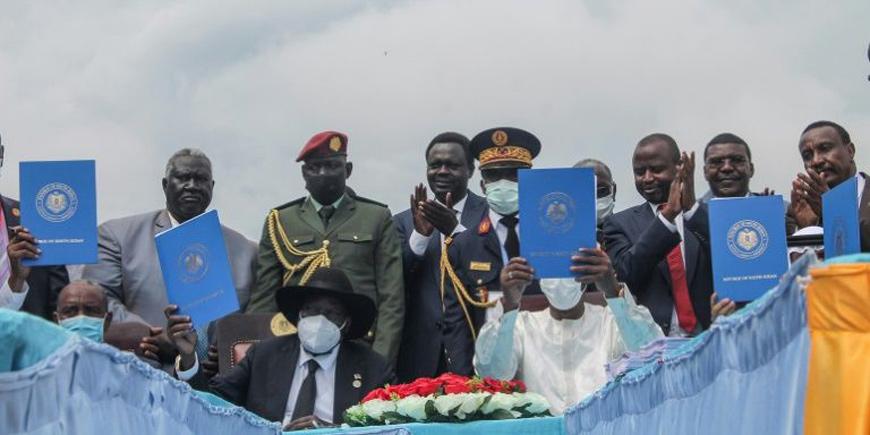- International News
- Mon-2020-11-16 | 03:44 pm

Sudan’s Prime Minister Abdalla Hamdok welcomed rebel leaders to the capital Khartoum on Sunday, as crowds celebrated what they hoped was the end of war following a landmark peace deal.
Hundreds of thousands died in decades of conflict, including in Sudan’s war-ravaged western region of Darfur.
"We have been looking forward to this day,” Hamdok said as he greeted the leaders, according to a broadcast by the official news agency SUNA.
"Today we are taking the first steps to put an end to the suffering of our people.”
It was the first time the leaders of the Sudan Revolutionary Front (SRF), a coalition of rebel and political groups, had come to the capital since the signing of an October 3 peace agreement in neighbouring South Sudan.
Jubilant crowds packed a central square in Khartoum, chanting and carrying banners, despite government warnings for people to take care amid the coronavirus pandemic.
"We feel the Sudanese people’s suffering,” said Alhadi Idris, the head of the SRF rebel coalition.
"From today, we will be part of the transitional government, and we will bear the consequences of its policies — we will be directly responsible for rescuing this country.”
Rebel leaders also met with Abdel Fattah Al Burhan, head of Sudan’s ruling sovereign council, who hailed them "as peacemakers and partners”.
‘Silences the gunfire’
The SRF — founded in 2011 — is an alliance of armed rebel groups and political movements including from Darfur and the southern states of Blue Nile and South Kordofan.
The United Nations estimates at least 300,000 people were killed and 2.5 million were displaced in the Darfur conflict, which broke out in 2003.
Conflict in South Kordofan and Blue Nile erupted in 2011, following unresolved issues from bitter fighting there in Sudan’s 1983-2005 civil war.
The peace deal covers a number of tricky issues, from land ownership, reparations and compensation, to wealth and power sharing and the return of refugees and internally displaced people.
"We have come to put the peace agreement into effect on the ground,” said SRF member Minni Minawi, according to state media.
Under the peace deal, a special court for crimes in Darfur must be set up, with the SRF calling for Bashir and his former aides to be put on trial.
Bashir has been jailed in Khartoum’s high security Kober prison and was found guilty last December of corruption.
He is currently on trial in Khartoum for his role in the 1989 coup that brought him to power, and has also been indicted by the International Criminal Court (ICC) accused of genocide in Darfur.
Hamdok outlined the economic, and living challenges facing the Sudanese people during his meeting with the rebels.
"This is the first time in Sudan’s history we reached a deal that truly addresses the roots of the Sudanese crisis,” said Hamdok.
"I am certain that this peace will help alleviate people’s suffering.”
Sudan has been led by a transitional administration since August last year, after the April 2019 ouster of longtime president Omar Al Bashir.
Sudan’s economy is in crisis, with an acute hard currency shortage, skyrocketing consumer prices and frequent power cuts.
But despite hopes for peace, holdout rebels remain, including the Darfur-based Sudan Liberation Movement faction led by Abdelwahid Nour, which is believed to maintain considerable support.
"We deserve to be happy about this peace deal, so long as it silences the gunfire,” paramilitary commander Mohamed Hamdan Daglo, deputy of the ruling sovereign council, told cheering crowds.













